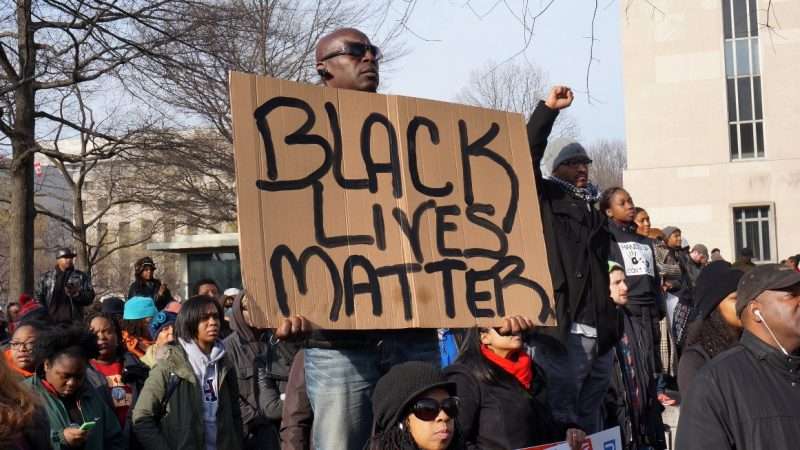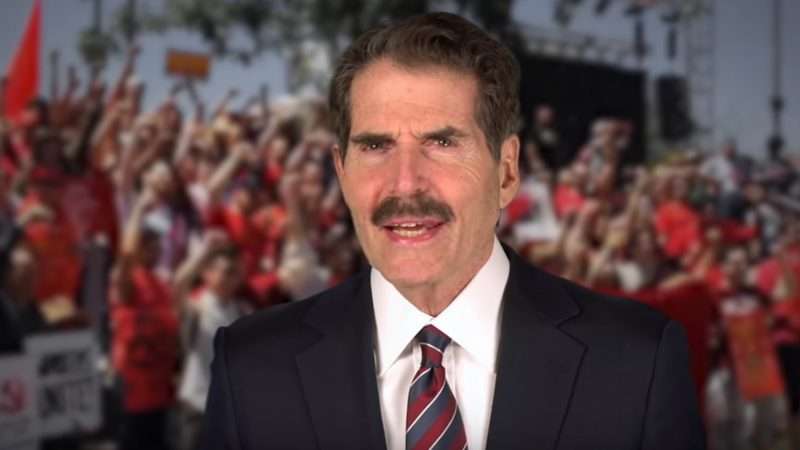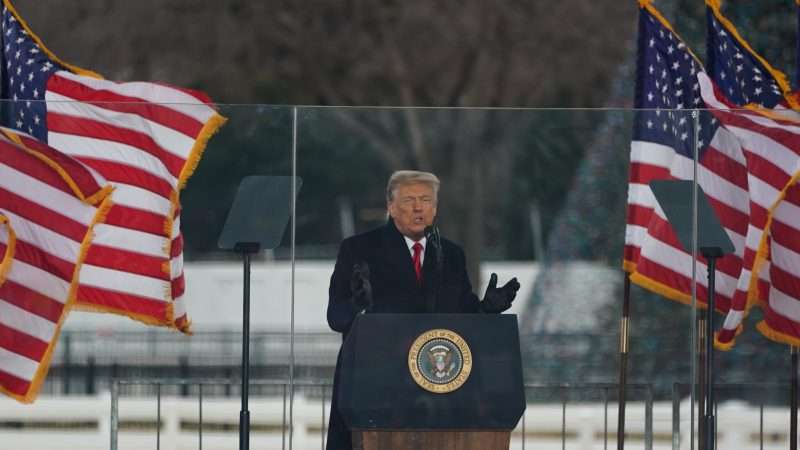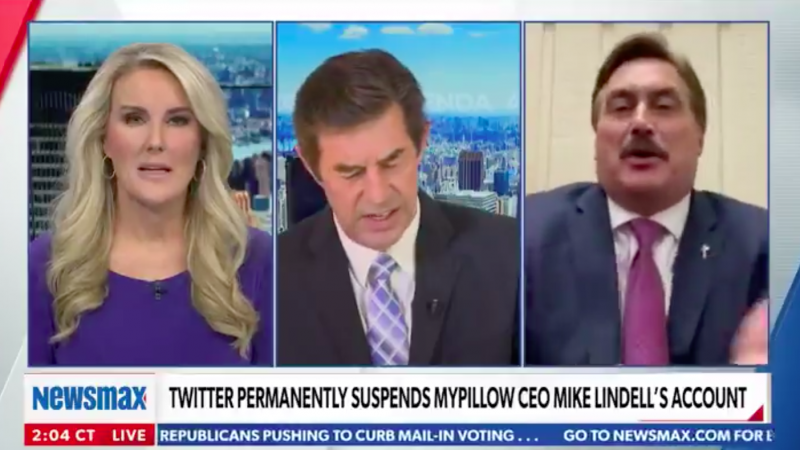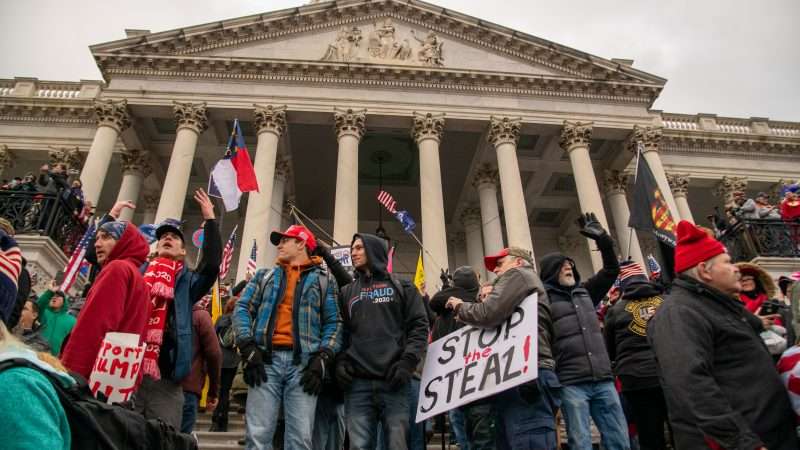Responding to Donald Trump’s impeachment in a 14-page brief filed today, his lawyers argue that he cannot be tried by the Senate because he is no longer president and that his promotion of the baseless claim that Joe Biden stole the presidential election, which inspired hundreds of his followers to launch a deadly attack on the Capitol last month, was protected by the First Amendment. And by the way, they say, there is “insufficient evidence” to conclusively determine that Trump’s wild claims of massive election fraud were false.
The House managers charged with prosecuting Trump in the Senate preemptively rebut those arguments in an 80-page trial memorandum that was also filed today. Their case is much more thorough and, on the whole, persuasive.
Trump’s argument that the Senate is not authorized to try him focuses on the constitutional text, which says the president “shall be removed from Office on Impeachment for, and Conviction of, Treason, Bribery, or other high Crimes and Misdemeanors.” The Constitution gives the House the “sole Power of Impeachment” and the Senate “the sole Power to try all Impeachments,” while limiting the penalties to “removal from Office, and disqualification to hold and enjoy any Office of honor, Trust or Profit under the United States.”
Those provisions do not apply to Trump, “since he is no longer ‘President,'” his lawyers say. “The constitutional provision requires that a person actually hold office to be impeached. Since the 45th President is no longer ‘President,’ the clause ‘shall be removed from Office on Impeachment for…’ is impossible for the Senate to accomplish, and thus the current proceeding before the Senate is void ab initio as a legal nullity that runs patently contrary to the plain language of the Constitution.” They also argue that “removal from office by the Senate of the President is a condition precedent which must occur before, and jointly with, ‘disqualification’ to hold future office,” meaning that a Senate trial cannot be justified by the possibility of disqualifying Trump from future federal office.
There are compelling arguments against this interpretation, based on the historical background, purposes, and prior use of the impeachment power. The House managers summarize those arguments in a 27-page section of their memorandum, noting that many legal scholars of various political persuasions think Trump is wrong on this point.
Michigan State law professor Brian Kalt gets into greater detail in his comprehensive 2001 treatment of the subject. While the record is mixed and often ambiguous, Kalt argues, the weight of the evidence supports impeachment and trial of former federal officials. Still, he calls it “a close and unsettled question.” George Washington University law professor Jonathan Turley, who is more inclined to credit Trump’s argument, likewise says the constitutionality of impeaching or trying a former president is “a close question upon which people of good faith can disagree.”
Trump’s argument that his unrelenting campaign to overturn Biden’s victory was consistent with his duties as president is much harder to take seriously. While Trump indisputably had a right to challenge the election results in court, the House managers note, the scores of lawsuits he and his allies filed were almost uniformly unsuccessful and never came close to changing the outcome. Instead of accepting the result, Trump continued to insist for months that he had actually won by a landslide, a fact he said would be apparent but for an elaborate criminal conspiracy that involved tricky election software and massive paper-ballot fraud.
“No President had ever refused to accept an election result or defied the lawful processes for resolving electoral disputes,” the House managers say. “Until President Trump.”
Some of the steps Trump took in the service of his election fantasy were by themselves clear abuses of power. The trial memorandum notes, for example, that he “tried to induce Michigan’s top Republican legislative officials to violate Michigan law by rejecting the popular vote and selecting a Trump slate of electors.” In a January 2 telephone conversation, Trump pressured Georgia Secretary of State Brad Raffensperger to “find” the votes necessary to overturn Biden’s victory in that state, warning that failing to do so would be “a criminal offense” and “a big risk for you.” Trump publicly and privately urged Vice President Mike Pence to block congressional affirmation of Biden’s victory. Since that is a power the vice president does not actually have, Trump was soliciting Pence to do something illegal.
Meanwhile, Trump continued to press his doomed cause with highly inflammatory rhetoric, castigating Republicans who questioned his claims and warning that democracy would be destroyed if Biden were allowed to take office. He continued doing that even after it became clear that some of his followers were responding with death threats and violence. His campaign to overturn the election results culminated in his fiery January 6 speech to thousands of supporters who had gathered in Washington, D.C., to “stop the steal” at his behest.
“All of us here today do not want to see our election victory stolen by emboldened radical-left Democrats, which is what they’re doing, and stolen by the fake news media,” Trump told them. “We will never give up. We will never concede….You’ll never take back our country with weakness. You have to show strength.”
Trump made the stakes clear. “We’re going to have somebody in there that should not be in there,” he said, “and our country will be destroyed. And we’re not going to stand for that.”
The House managers suggest that Trump’s speech, during which he also warned that “if you don’t fight like hell you’re not going to have a country anymore,” legally qualified as incitement to riot and exceeded the bounds of free speech as described by the Supreme Court in the 1969 case Brandenburg v. Ohio. They also imply that the Trump’s remarks disqualified him from office under Section 3 of the 14th Amendment, which applies to federal officials who “have engaged in insurrection or rebellion.”
All three propositions are dubious. But you need not believe them to conclude that Trump acted recklessly, without regard to the probable impact of his words, when he fired up the protesters with his apocalyptic warnings and demands for action while directing them at the Capitol, where a joint session of Congress was about to confirm the election results. Notwithstanding his suggestion that the protesters make their voices heard “peacefully,” it was entirely predictable that at least some of them would go further than that.
After the protest turned violent, Trump compounded his irresponsibility by only belatedly urging his supporters to be “peaceful,” even while reinforcing the imaginary grievance on which the rioters were acting. “At 1:49 PM, after insurrectionists had overcome the Capitol perimeter—and after reports of pipe bombs had been confirmed—President Trump retweeted a video of his speech at the rally,” the trial memorandum notes. “Just over thirty minutes later, at 2:24 PM, while rioters were still attacking police and after Vice President Pence had been evacuated from the Senate floor, President Trump again tweeted to excoriate the Vice President for refusing to obstruct the Joint Session: ‘Mike Pence didn’t have the courage to do what should have been done to protect our Country and our Constitution.'”
The House managers add that Trump “did not take any action at all in response to the attack until 2:38 PM, when he issued his first tweet, and 3:13 PM, when he issued a second.” The first tweet said protesters should “remain peaceful,” while the second said there should be “no violence.”
During this time, the House managers say, “not only did President Trump fail to issue unequivocal statements ordering the insurrectionists to leave the Capitol; he also failed in his duties as Commander in Chief by not immediately taking action to protect Congress and the Capitol. This failure occurred despite multiple members of Congress, from both parties, including on national television, vehemently urging President Trump to take immediate action.”
Finally, more than three hours after the riot started, Trump released a video in which he urged “peace” and told his supporters to “go home.” At the same time, he reiterated that the election was “stolen from us” after he won in “a landslide” and closed with this mixed message: “We love you, you’re very special.…I know how you feel. But go home and go home in peace.” That evening Trump tweeted: “These are the things and events that happen when a sacred landslide election victory is so unceremoniously & viciously stripped away from great patriots who have been badly & unfairly treated for so long. Go home with love & in peace. Remember this day forever!”
Trump later told reporters his pre-riot speech was “totally appropriate.” According to his lawyers’ brief, he simply “expressed his opinion that the election results were suspect.” To the extent that the impeachment “alleges his opinion is factually in error,” they say, Trump “denies this allegation.” More generally, the brief says, Trump after the election “exercised his First Amendment right” to “express his belief that the election results were suspect, since with very few exceptions, under the convenient guise of Covid-19 pandemic ‘safeguards,’ states’ election laws and procedures were changed by local politicians or judges without the necessary approvals from state legislatures.”
That argument, which state and federal judges rejected in every case but one (involving election observers in Pennsylvania), is just a small part of the story Trump has been telling since the election. He has insisted, again and again, that Biden won only because of massive cheating on a scale never before seen in U.S. history. Neither his lawyers nor any of his allies were able to muster credible evidence to back up that tall tale. Yet his lawyers’ take is that “insufficient evidence exists upon which a reasonable jurist could conclude that the 45th President’s statements were accurate or not, and he therefore denies they were false.”
Trump also avers that his statements, true or not, cannot amount to an impeachable offense because they were protected by the First Amendment. But freedom of speech “does not protect government officials from accountability for their own abuses in office,” the House managers say. “The Supreme Court has made clear that the First Amendment does not shield public officials who occupy sensitive policymaking positions from adverse actions when their speech undermines important government interests. Thus, just as a President may legitimately demand the resignation
of a Cabinet Secretary who publicly disagrees with him on a matter of policy (which President Trump did repeatedly), the public’s elected representatives may disqualify the President from federal office when they recognize that his public statements constitute a violation of his oath of office and a high crime against the constitutional order.”
George Mason law professor Ilya Somin likewise notes that “high government officials don’t have a First Amendment right to be protected from firing based on their political views.” That principle, he says, “applies to presidents facing impeachment no less than other officials.”
The House managers also address the argument that Trump’s trial will only exacerbate the bitter political divisions between his supporters and his opponents. “Many have suggested that we should turn the page on the tragic events of January 6, 2021,” they say. “But to heal the wounds he inflicted on the Nation, we must hold President Trump accountable for his conduct and, in so doing, reaffirm our core principles. Failure to convict would embolden future leaders to attempt to retain power by any and all means—and would suggest that there is no line a President cannot cross. The Senate should make clear to the American people that it stands ready to protect them against a President who provokes violence to subvert our democracy.”
Since Trump’s acquittal seems to be a foregone conclusion, I’m not sure how clear a message the trial will send on that score. But there is value in laying out the details of this shameful and horrifying episode. Even if only a handful of Republicans favor conviction, a bipartisan vote will signal that Trump did much more, and much worse, than express an opinion.

from Latest – Reason.com https://ift.tt/3jb0aTr
via IFTTT
